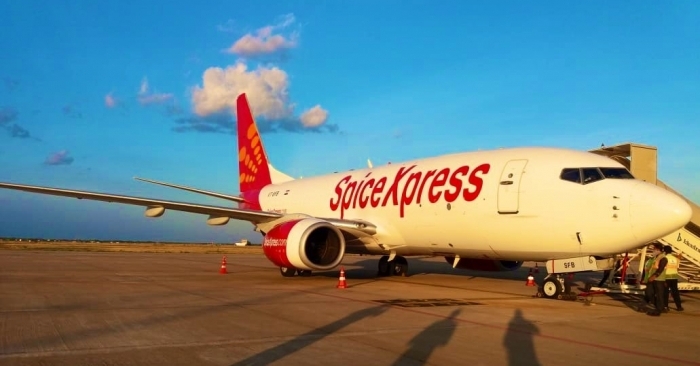SpiceJet reported net loss of Rs 807 crore in Q4 of FY 2020
July 30, 2020: SpiceJet reported a net loss of Rs 807.1 crore in the fourth quarter of FY20 (that includes a non-cash loss of Rs 473.4 crore due to forex loss on the restatement of lease liability due to Ind-AS 116) against a profit of Rs 56.3 crore in the same quarter of the previous year.

July 30, 2020: SpiceJet reported a net loss of Rs 807.1 crore in the fourth quarter of FY20 (that includes a non-cash loss of Rs 473.4 crore due to forex loss on the restatement of lease liability due to Ind-AS 116) against a profit of Rs 56.3 crore in the same quarter of the previous year.
The fourth quarter also saw cargo revenue of the airline increasing 94 percent. The airline reported a net loss of Rs 934.8 crore in FY 2020 (that includes a non-cash loss of Rs 697.0 crore due to forex loss on the restatement of lease liability due to Ind-AS 116).
Operating revenues were at Rs 2,863.9 crore for the reported quarter and Rs 12,358.6 crore for fiscal 2020. On an EBITDA basis, the loss was Rs 223.6 crore for the reported quarter and profit of Rs 1,273.9 crore for fiscal 2020. On an EBITDAR basis, the loss is Rs 90.9 crore for the reported quarter and profit of INR 1,636.8 crore for fiscal 2020.
Ajay Singh, chairman and managing director, SpiceJet, said, “Two key factors that adversely impacted our performance and the bottom line was the Covid-19 pandemic that started affecting demand adversely from mid-February and grounding of the 737 MAX, which has been out of service for over a year now. Despite the year-long grounding of the MAX aircraft, SpiceJet ran a profitable operation till Covid-19 hit demand from mid-February. Indian and the global aviation industry are going through the toughest-ever phase in aviation history. We at SpiceJet have constantly adapted to the changing economic environment and I am happy that our cargo operations have performed very well. I am confident that things will only improve in the times to come. We remain cautious but optimistic about the future.”
Boeing 737 MAX
On the grounded Boeing 737 MAX aircraft, the company continues to incur various costs with respect to these aircraft and during this quarter ended March 30, 2020, on account of its inability to undertake revenue operations, the company has recognized Rs 134.5 crore towards aircraft and supplemental lease rentals and other identified expenses, as other income for the reported quarter. This is a part recognition of the total reimbursements, on which the Company is working with the aircraft manufacturer, towards various ascertained costs and losses incurred by the Company on this aircraft.
The average domestic load factor for the quarter was 90% while for fiscal 2020 it was 92%. For 58 months-in-a-row, SpiceJet has flown with over 90% load factors in the Indian aviation market.
SpiceXpress
SpiceJet has transported around 26,000 tonnes of cargo on more than 4650 flights since the lockdown began on March 25. SpiceXpress, SpiceJet’s dedicated cargo arm, in addition to handling its regular cargo business, also transported surgical supplies, sanitizers, face masks, coronavirus rapid test kits, IR thermometers etc. and providing doorstep deliveries of essential supplies, medicines and medical equipment to various cities in India during the lockdown period. The airline also helped Indian farmers maintain continuity of supply chains by operating special cargo flights to take farm produce, fresh fruit and vegetables to various domestic and international destinations.
Pioneer of India’s ‘Marine Krishi Udaan’, the airline introduced dedicated freighter services to boost India’s shrimp farming in February 2020. Through SpiceXpress, the airline deployed its Boeing 737 aircraft on Chennai-Visakhapatnam and Surat-Kolkata routes, becoming the first to connect the cities through a freighter route.
Business updates
1. After 13 years of being an integral part of SpiceJet, our CFO, Kiran Koteshwar, has decided to pursue an exciting opportunity overseas. He will remain with SpiceJet till August 31, 2020, and for a transition thereafter.
2. Since April 1, 2019, the airline has added 38 aircraft which included 737s, Q400s and freighters as it celebrated the big milestone of inducting its 100th aircraft – a Boeing 737.
3. SpiceJet consolidated its position at Mumbai Airport by shifting its operations from the Domestic Terminal (T1) to the state-of-the-art Terminal 2 (T2) at Chhatrapati Shivaji Maharaj International Airport.
4. During the lockdown, SpiceJet played a key role in keeping the country’s supply chain intact. On April 7, 2020, SpiceJet operated India’s first cargo-on-seat flight carrying vital supplies in the passenger cabin and belly space. Since then, the airline has been regularly deploying its B737 and Q400 passenger aircraft to carry cargo in the passenger cabin.



